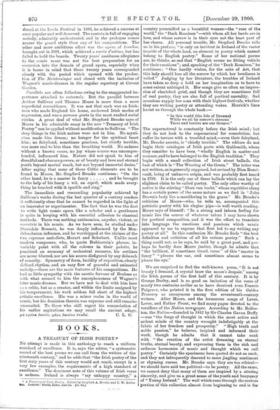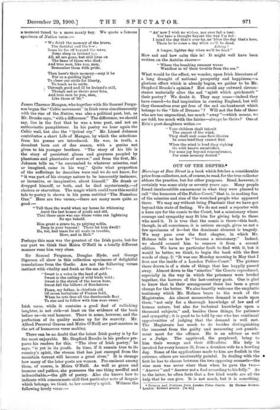BOOKS.
A TREASURY OF IRISH POETRY.*
No attempt is made in this anthology to reach a uniform standard of excellence. It is, says the editor, "a systematic record of the best poems we can cull from the writers of the nineteenth century," and he adds that "the Irish poetry of the first sixty years of this century would not reach, except in a very few examples, the requirements of a high standard of excellence." The dominant note of this volume of Irish verse is sadness. Ireland is always "my unhappy country," a
" A Treasury of Trish Poetry. Edited by Stopford A. Brooke and T. W. Bolles- Son. London Smith, Elder, and Co. [75. 6d.] country personified as a beautiful woman—the "rose of the world," the "Dark Rosaleen."—with whom all her bards are in love, and whose sorrow is in their eyes not the least part of her charm. All personal trouble, Mr. Stopford Brooke tells us in his preface, "is only an incident in Ireland of the vaster trouble of the whole land, an element in poetry which cannot belong to English poetry." Some of her national poems are, he thinks, so sad that "English seems no fitting vehicle for their emotions"; and, speaking of the "Dark Rosaleen," he continues : "One hardly wishes, for the sake of Art, that this lady should lose all the sorrow by which her loveliness is veiled." Judging by her literature, the troubles of Ireland have taken so deep a hold on her imagination as to have to some extent unhinged it. Her songs give us often an impres- sion of cherished grief, and though they are sometimes full of real poetry, they are also full of poetical unreality. Sad occasions supply her sons with their highest festivals, whether they are writing poetry or attending wakes. Herrick's lines haunt us through the whole book :—
" In this world (the Isle of Dreams) While we sit by sorrow's streams Tears and terrors are our themes."
The supernatural is constantly before the Irish mind; but they do not look to the supernatural for consolation, but suffer its terrors with a troubled mind,—even their fairyland, Mr. Brooke asserts, is "chiefly terrible." The editors do not begin their catalogue of Irish poets with Goldsmith, whom they consider to have been "wholly English in matter and manner, and to have belonged to the English tradition." They begin with a small collection of Irish street ballads, the best of which is "The Wearing of the Green." The latter was not written, as is generally supposed, but revised by Dion Bouci- cault, being of unknown origin, and was probably first heard in 1798. It is the only one of these ballads which can lay the slightest claim to be called poetry. The only other worthy of notice is the stirring "Shan van vocht," whose repetitive clang has a certain power of the same nature as we find in "John Brown's body lies a-mouldering in the grave." Mr. Brooke's criticism of Moore—who, he tells us, accompanied this patriotic poetry with his elegiac pipe—is well worth reading. Moore says of himself: "In a strong and inborn feeling for music lies the source of whatever talent I may have shown for poetical composition, and it was the effort to translate into language the emotions and passions which music appeared to me to express that first led to my writing any poetry at all." In this confession Mr. Brooke finds "the best definition and criticism of all his serious poetry." Such a thing could not, as he says, be said by a great poet, and per- haps he hardly does Moore justice, though he admits that "the brilliant, if sometimes tinsel, verse" of this "master in fancy" "pleases the ear, and sometimes almost seems to please the eye."
We are surprised to find the well-known poem, "It is not beauty I demand, A crystal brow the moon's despair," among the lush poems of the first half of this century. It is by George Darley, and is so good an imitation of the verse of nearly two centuries earlier as to have deceived even Francis Palgrave, who printed it in the first edition of his Golden Treasury as anonymous among the seventeenth-century writers. After Moore, and the humorous songs of Lever, Lover, and Father Prout, we find many pages devoted to the versifiers of the Nation newEipaper. According to Mr. Rolles- ton, the Nation—founded in 1842 by Sir Charles Gavan Duffy —was "the forge of thought in which the most active and ardent minds of the country wrought indefatigably at the fabric of her freedom and prosperity." "High truth and noble passion," he believes, inspired and informed their work, though he admits that it cannot take rank with "the creation of the artist dreaming on eternal truths, eternal beauty, and expressing them in the rich and arduous harmonies of music and thought which we call poetry." Certainly the specimens here quoted do not so rank, and they not infrequently descend to mere jingling sentiment or rhyming curses. Mr. Brooke says they are too ethical— we should have said too political—to be poetry. All the same, we cannot deny that many of them are inspired by a stilling sincerity, and give us a great sense of the youth and buoyancy of "Young Ireland." The wail which runs through the serious portion of this collection almost from beginning to end is for
a moment tuned, to a more manly key. We quote a famous specimen of Nation verse :—
" We-drink the memory of the brave, The faithful and the few; Some lie far off beyond the wave, Some sleep in Ireland too. All, all are gone, but still lives on The fame of those who died: And true men, like you, men, Remember them with pride.
Then here's their memory—may it be For US a guiding light
To cheer our strife for liberty, To teach us to unite.
Through good and ill be Ireland's still, Though sad as theirs your' fate, And true men be you, men,: Like those of '98."
James Clarence Mangan, who together with Sir Samuel Fergu- son began the "Celtic movement" in Irish verse simultaneously with the rise of the Nation, was also a political poet, but, as Mr. Brooke says," with a difference." The difference, we should say, lies in the fact that he was a true poet, and not an enthusiastic pamphleteer. In his poetry we hear again the Celtic wail, but also the "lyrical cry." Mr. Lionel Johnson contributes a short Life of Mangan, by which the selections from his poems are introduced. He was, in truth, a decadent born out of due season, with a genius not given to his younger brothers. "The story of his life is the story of persistent gloom and greyness peopled by phantoms and phantasies of sorrow," and from the first, Mr. Johnson tells us, "he succumbed to whatever miseries, real or imagined, came in his way." Quite what proportion of the sufferings he describes were real we do not know, for "it was part of his strange nature to be innocently insincere, or inventive, or imaginative, about himself." He drank or dragged himself, or both, and he died mysteriously,—of cholera or starvation. The magic which could turn this sordid tale to poetry is shown in his poem entitled "The Nameless One." Here are two verses,—there are many more quite as good
" Tell thou the world when my bones lie whitening Amid the last homes of youth and eld. That there once was one whose veins ran lightning No eye beheld.
Him grant a grave to., ye pitying noble, Deep in your bosoms ! There let him dwell ! He, too, had tears for all souls in trouble, Here, and in HelL"
Perhaps this man was the greatest of the Irish poets, but for our part we think that Moira O'Neill in a totally different manner runs him very close.
Sir Samuel Ferguson, Douglas Hyde, and George Sigerson all show in this collection specimens of delightful translations from the Gaelic. Are not the following verses instinct with vitality and fresh as the sea air ?—
" Sweet is a voice in the land of gold, Sweet is the calling of wild birds bold ; Sweet is the shriek of the heron hoar, Sweet fall the billows of Bundatrore.
Pious, my father, is chieftain old Of seven battalions of Fianna bold, When he sets free all the deerhounds fleet To rise and to follow with him were sweet."
Irish verse, while it contains a good. • deal of rollicking laughter, is not rich—at least on the evidence of the book before us—in real humour. There is some, however, and the perfection of its quality makes up for its scarcity. Mr. Alfred Perceval Graves and Moira O'Neill are past-masters in the art of humorous verse making.
There can be no doubt that the latest Irish poetry is by far the most enjoyable. Mr. Stopford Brooke in his preface pre- pares his readers for this. "The river' of Irish poetry," he says, "is yet in its youth. In time, if' it remain true to its country's spirit, the stream that has just emerged from the mountain torrent will become a great river." It is strange how many of the later poets are women. Pre-eminent among them, of course, is Moira O'Neill. As well as grace and humour and pathos, she possesses the one thing needful and
indescribable,—the gift of poetry. Also she knows how to indicate with consummate skill that particular note of despair which belongs, we think, to her country's spirit. Witness the
following lovely verse :—
" An' now I wish no wishes, nor ever fall a tear,
Nor take a thought beyont the way I'm led : I mind the day that's over-by, an' bless the day that's here, There be to come a day when we'll be dead,
Achrny ! A longer, lighter day when we'll be dead."
How sad and how calm this is! It might well have been written on the Antrim shores-
" Where the breaking summer waves Wandher in wi' their trouble from the sea."
What would be the effect, we wonder, upon Irish literature of a long draught of national prosperity and happiness,—a glorious effect which is already begun, we gather to be Mr. Stopford Brooke's opinion ? But could any outward circum- stance materially alter the sad "spirit which quickeneth " their poetry ? We doubt it. They may cease—indeed they have ceased—to find inspiration in cursing England, but will they themselves ever get free of the sad enchantment which belongs to the "Isle of Dreams " ? Will not the fate of those who are too impractical, too much "away "—which means, we are told, too much with the fairies—always be theirs? One of Erin's poet-daughters writes :—
"Your children shall inherit
The unrest of the wind, They shall seek some face illusive In some land they cannot find.
When the wind is loud they sighing Go with hearts unsatisfied, For some joy beyond remembrance, For some memory denied."



































 Previous page
Previous page